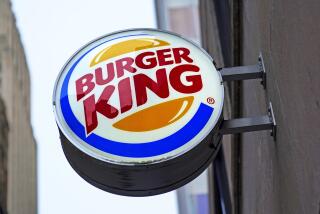Splenda maker getting legal vitriol from sugar firms
The next battle in the Splenda wars is about to begin.
A hearing in a false-advertising lawsuit against the company that makes the sweetener is scheduled for Monday in federal court in Los Angeles. Filed by five U.S. sugar companies, the suit claims McNeil Nutritionals has deliberately misled consumers with its âmade from sugar, tastes like sugarâ advertising campaign.
âWe believe it is manipulation on an important subject,â said Dan Callister, a lawyer for the Sugar Assn. Inc.: âwhat you are going to eat for the rest of your life.â
McNeil, which is owned by Johnson & Johnson of New Brunswick, N.J., says the suit has no merit and should be dismissed because the sugar companies waited too long under the law to take legal action. The only reason the companies sued in 2004 -- four years after the âtastes like sugarâ ad campaign began -- was that âSplenda presents a unique threat to the sugar industry,â McNeil says in court documents.
Six months ago, McNeil settled a similar lawsuit filed by Merisant Co. of Chicago, which makes Equal. And a French court ruled recently that Splendaâs slogan -- which translates as âbecause it comes from sugar, sucralose tastes like sugarâ -- violates French consumer protection laws, and it awarded Merisant about $50,000.
Splenda is the brand name for sucralose, which uses a chemical process to alter sugar, eliminating most of its calories, by adding chlorine.
In court documents, the sugar companies claim this process employs âphosgene gas -- a deadly weapon used during World War I.â Numerous Food and Drug Administration studies have found sucralose safe for consumption. A spokesman for the Center for Science in the Public Interest, which filed a legal brief siding with the sugar industry in the case, said the center had no qualms about Splendaâs safety.
Splenda replaced Equal as the top-selling sugar substitute in 2003, according to data from market research firm Information Resources Inc. Sales of the 10 top brands of white sugar declined slightly from 2002 to 2006, while sales of Splenda increased more than threefold.
McNeil has since introduced baking products such as Splenda Sugar Blend for Baking and Splenda Brown Sugar Blend, saying that Splenda can be used for baking because it can withstand heat unlike other sugar substitutes. Splenda is also now used in products from Coca-Cola Co., PepsiCo Inc. and General Mills Inc.
The sugar companies -- American Sugar Refining Inc., C&H; Sugar Co. (now owned by American Sugar), Imperial Sugar Co., Rio Grande Valley Sugar Growers Inc. and Western Sugar Cooperative -- claim that McNeil not only intentionally misled consumers about whether Splenda was natural but also continued the advertising campaign knowing that people were confused.
The lawsuit says McNeil âunsheathed the double-edged sword of consumer confusionâ to boost Splenda sales.
A Center for Science in the Public Interest study of 426 people conducted in 2004 found that 47% of Splenda users thought it was a natural product. McNeil says in court filings that reams of consumer research conducted âconfirm that consumers well understand that Splenda is not âtruly natural.â â
A section of a federal statute called the Lanham Act, signed into law in 1946, makes false and misleading advertising illegal, said Daniel Klerman, a professor of law at USC. The sugar companies will have to prove that consumers were reaching the wrong inferences because of Splendaâs advertising, he said. Damages can be doubled or tripled if it is proved that misrepresentations were intentional.
McNeil and the sugar companies have been engaging in out-of-court warfare on the Internet, where the anti-Splenda camp seems to have more allies. The first page of a Google search for Splenda displays results such as âthe lethal science of Splenda, a poisonous chlorocarbonâ and âSplenda (Sucralose) Toxicity Exposed.â
The Splenda-sponsored website, splendatruth.com, emphasizes the numerous studies that have found Splenda safe. The home page of the sugar industryâs site, www.truthaboutsplenda.com, asks, âDo you know what your children are eating?,â and features comments from consumers who say they feel deceived by Splenda advertising.
That site, which McNeil calls a âsmear campaign,â has spurred its own issues. McNeil filed a lawsuit in U.S. District Court in Delaware in 2005 to prevent the sugar association from making further âmisleadingâ claims about Splenda, which it says âare designed to injure its reputation and goodwill.â
--
More to Read
Inside the business of entertainment
The Wide Shot brings you news, analysis and insights on everything from streaming wars to production â and what it all means for the future.
You may occasionally receive promotional content from the Los Angeles Times.










